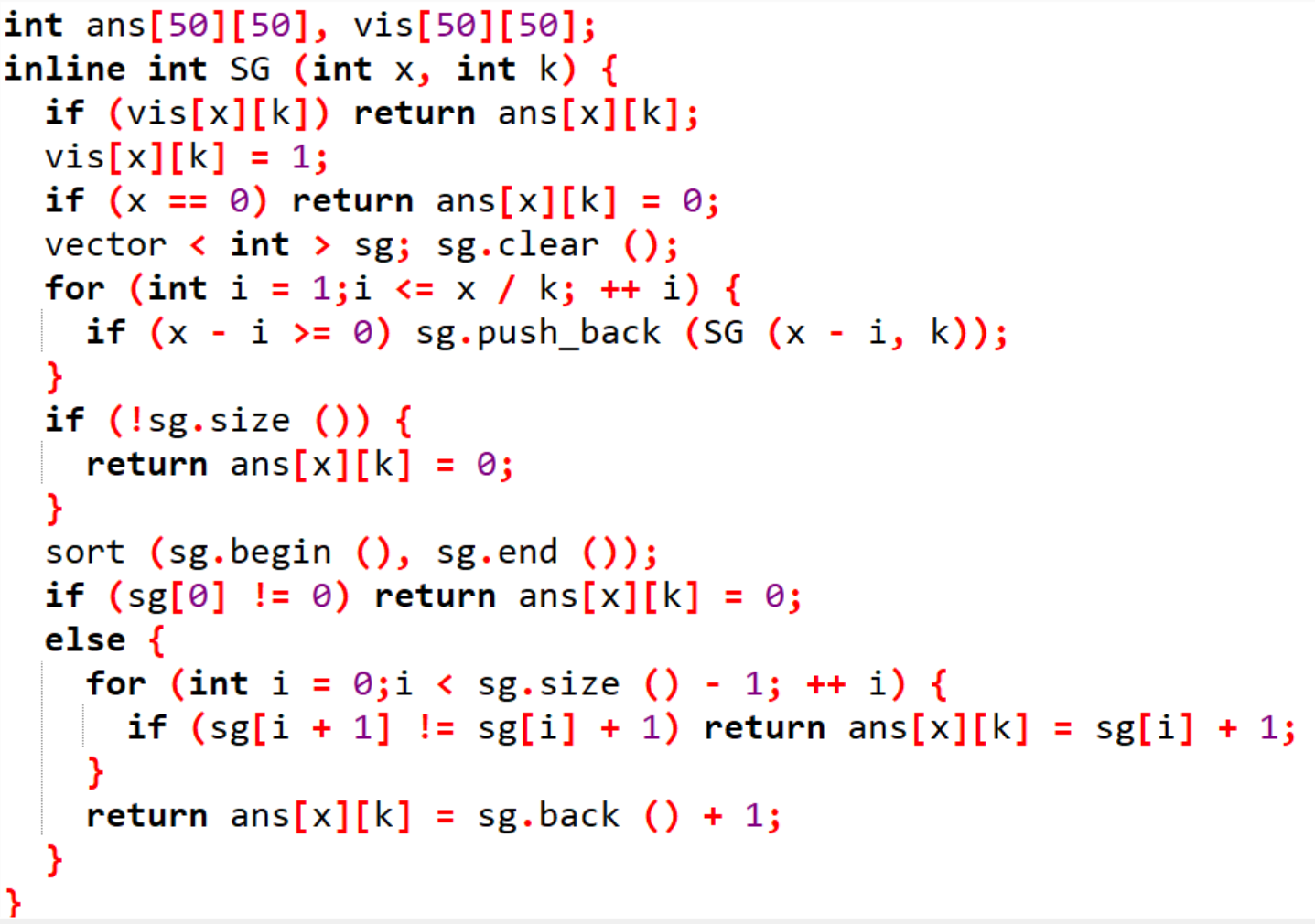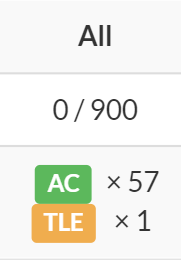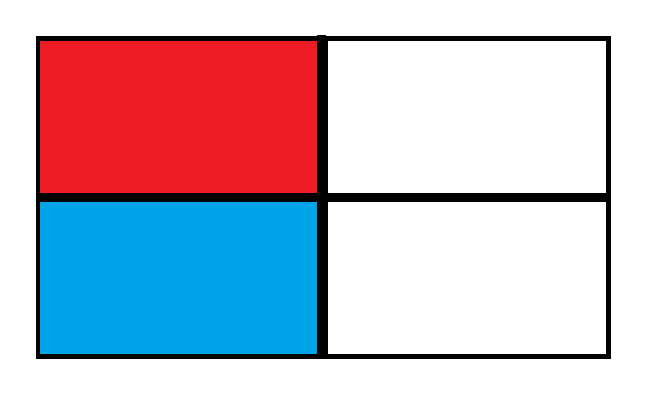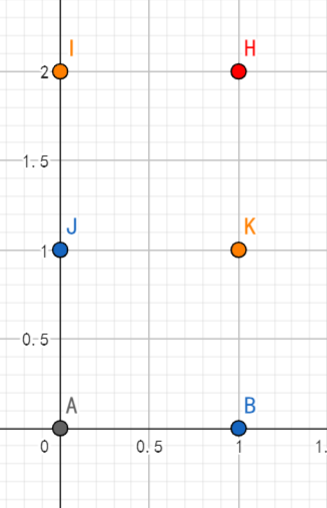AtCoder 好题选做
AtCoder Regular Contest 091 - F - Strange Nim
https://atcoder.jp/contests/arc091/tasks/arc091_d
清北学堂讲的一道题,我艹感觉这结论很难猜啊。
做这种题一定是先写爆搜打表啊,先写了一个博弈论求 SG 函数:

然后发现了一个规律:\(\text{SG}(nk,k)=n\)。
还有一个规律:当 \(n < k\) 时,有 \(\text{SG}(n, k) = 0\)。
考虑将 SG 函数值分组:

然后我们发现:
现在我们就将 \(\text{SG}\) 函数的表达式算好了,整理有:
然后就只会暴力求,就会得到这个,就去看了一眼 Solution,感觉特别牛逼:

分析一下,相当于每一次减去 \(\left\lfloor\dfrac{n}{k}\right\rfloor + 1\),考虑将一样的操作合并,设暂时的 \(\left\lfloor\dfrac{n}{k}\right\rfloor\) 为 \(d\),那么距离下一个 \(d\) 有 \(n - kd\),一步为 \(d + 1\),那么可以合并 \(\left\lceil\dfrac{n - kd}{d + 1}\right\rceil\) 步为一步,这样就可以过了。
时间复杂度?类似于数论分块,毛估估一下是根号级别的,实测 44ms,特别快。

#include <bits/stdc++.h>
#include <ext/pb_ds/assoc_container.hpp>
#include <ext/pb_ds/tree_policy.hpp>
#include <ext/pb_ds/hash_policy.hpp>
using namespace std;
using namespace __gnu_pbds;
#ifdef LOCAL
#include "algo/debug.h"
#else
#define debug(...) 42
#endif
typedef long long ll;
typedef pair < int, int > PII;
typedef int itn;
mt19937 RND_MAKER (chrono :: steady_clock :: now ().time_since_epoch ().count ());
inline ll randomly (const ll l, const ll r) {return (RND_MAKER () ^ (1ull << 63)) % (r - l + 1) + l;}
//#define int long long
const double pi = acos (-1);
//__gnu_pbds :: tree < Key, Mapped, Cmp_Fn = std :: less < Key >, Tag = rb_tree_tag, Node_Upadte = null_tree_node_update, Allocator = std :: allocator < char > > ;
//__gnu_pbds :: tree < PPS, __gnu_pbds :: null_type, less < PPS >, __gnu_pbds :: rb_tree_tag, __gnu_pbds :: tree_order_statistics_node_update > tr;
inline int read () {
int x = 0, f = 0;
char c = getchar ();
for ( ; c < '0' || c > '9' ; c = getchar ()) f |= (c == '-');
for ( ; c >= '0' && c <= '9' ; c = getchar ()) x = (x << 1) + (x << 3) + (c & 15);
return !f ? x : -x;
}
inline int SG (int x, int k) {
while (x % k && x >= k) {
int d = x / k;
int merge = (x - k * d) / (d + 1);
if ((x - k * d) % (d + 1)) merge ++;
x -= merge * (d + 1);
}
return x / k;
}
int n, res;
signed main () {
// freopen ("AT_arc091_d.txt", "w", stdout);
n = read ();
for (int i = 1;i <= n; ++ i) {
int x = read (), k = read ();
res ^= SG (x, k);
}
if (!res) printf ("Aoki\n");
else printf ("Takahashi\n");
return 0;
}
AtCoder Beginner Contest 082 - D - FT Robot
https://atcoder.jp/contests/abc082/tasks/arc087_b
一开始发现我艹,这道题的决策数量这么多,做不了了啊。
然后我想到,决策数量多的,一般都是 DP,然后就想到了做可行性 DP。
然后我们转化一下问题,将第 \(x\) 段,有 \(k\) 个 F 的记作 x 轴(如果 \(x \bmod 2 = 0\) 就是 y 轴)的坐标加减 \(k\)(第一段只能加),然后对于能到达的横坐标和纵坐标分别 DP,就可以了。
因为坐标可能有负数,所以要加上一个足够大(8015)的偏移量。
srds,一交就 WA,查了好久的错误才发现是最后到达的坐标是 \((x,y)\),不是过程中到达 \((x, y)\) 就可以。
#include <bits/stdc++.h>
#include <ext/pb_ds/assoc_container.hpp>
#include <ext/pb_ds/tree_policy.hpp>
#include <ext/pb_ds/hash_policy.hpp>
using namespace std;
using namespace __gnu_pbds;
#ifdef LOCAL
#include "algo/debug.h"
#else
#define debug(...) 42
#endif
typedef long long ll;
typedef pair < int, int > PII;
typedef int itn;
mt19937 RND_MAKER (chrono :: steady_clock :: now ().time_since_epoch ().count ());
inline ll randomly (const ll l, const ll r) {return (RND_MAKER () ^ (1ull << 63)) % (r - l + 1) + l;}
//#define int long long
const double pi = acos (-1);
//__gnu_pbds :: tree < Key, Mapped, Cmp_Fn = std :: less < Key >, Tag = rb_tree_tag, Node_Upadte = null_tree_node_update, Allocator = std :: allocator < char > > ;
//__gnu_pbds :: tree < PPS, __gnu_pbds :: null_type, less < PPS >, __gnu_pbds :: rb_tree_tag, __gnu_pbds :: tree_order_statistics_node_update > tr;
inline int read () {
int x = 0, f = 0;
char c = getchar ();
for ( ; c < '0' || c > '9' ; c = getchar ()) f |= (c == '-');
for ( ; c >= '0' && c <= '9' ; c = getchar ()) x = (x << 1) + (x << 3) + (c & 15);
return !f ? x : -x;
}
const int D = 8015;
bool fx[D][2 * D + 100], fy[D][2 * D + 100];
int dx[D][2], dy[D][2], cntx, cnty, tmp, n, goalx, goaly, type, already = 1;
int qwqx[D], qwqy[D], cnt;
char s[D];
signed main () {
scanf ("%s", s + 1);
n = strlen (s + 1);
goalx = read () + D, goaly = read () + D;
type = 0;
for (int i = 1;i <= n; ++ i) {
if (s[i] == 'T') {
if (already) {
already = 0;
if (type == 0) {
cntx ++;
dx[cntx][0] = tmp;
qwqx[cntx] = ++ cnt;
}
else {
cnty ++;
dy[cnty][0] = tmp;
qwqy[cnty] = ++ cnt;
}
}
else {
if (type == 0) {
cntx ++;
dx[cntx][0] = tmp;
dx[cntx][1] = -tmp;
qwqx[cntx] = ++ cnt;
}
else {
cnty ++;
dy[cnty][0] = tmp;
dy[cnty][1] = -tmp;
qwqy[cnty] = ++ cnt;
}
}
tmp = 0;
type ^= 1;
}
else {
tmp ++;
}
}
if (already) {
already = 0;
if (type == 0) {
cntx ++;
dx[cntx][0] = tmp;
qwqx[cntx] = ++ cnt;
}
else {
cnty ++;
dy[cnty][0] = tmp;
qwqy[cnty] = ++ cnt;
}
}
else {
if (type == 0) {
cntx ++;
dx[cntx][0] = tmp;
dx[cntx][1] = -tmp;
qwqx[cntx] = ++ cnt;
}
else {
cnty ++;
dy[cnty][0] = tmp;
dy[cnty][1] = -tmp;
qwqy[cnty] = ++ cnt;
}
}
fx[0][D] = true;
for (int i = 1;i <= cntx; ++ i) {
for (int j = 0;j <= 2 * D + 99; ++ j) {
int las1 = j - dx[i][0];
int las2 = j - dx[i][1];
if (las1 >= 0 && las1 <= 2 * D + 99) fx[i][j] |= fx[i - 1][las1];
if (las2 >= 0 && las2 <= 2 * D + 99) fx[i][j] |= fx[i - 1][las2];
}
}
fy[0][D] = true;
for (int i = 1;i <= cnty; ++ i) {
for (int j = 0;j <= 2 * D + 99; ++ j) {
int las1 = j - dy[i][0];
int las2 = j - dy[i][1];
if (las1 >= 0 && las1 <= 2 * D + 99) fy[i][j] |= fy[i - 1][las1];
if (las2 >= 0 && las2 <= 2 * D + 99) fy[i][j] |= fy[i - 1][las2];
}
}
bool jud = false;
for (int i = cntx;i <= cntx; ++ i) {
for (int j = cnty;j <= cnty; ++ j) {
int T = qwqx[i], H = qwqy[j];
if (!T && !H) jud |= (fx[i][goalx] & fy[j][goaly]);
else if (T < H && (i == cntx || qwqx[i + 1] > H)) jud |= (fx[i][goalx] & fy[j][goaly]);
else if (H < T && (j == cnty || qwqy[j + 1] > T)) jud |= (fx[i][goalx] & fy[j][goaly]);
}
}
if (jud) printf ("Yes\n");
else printf ("No\n");
return 0;
}
AtCoder Beginner Contest 071 - D - Coloring Dominoes
https://atcoder.jp/contests/abc071/tasks/arc081_b
写在前面:这道题没有做出来,看的 Solution。/ll
我们考虑从左向右填多米诺,分以下四种情况:
1st、

右面可以填蓝色 / 绿色,方案数为 \(2\)。
2nd、

右面只可以填绿色,方案数为 \(1\)。
3rd、

右面可以上面填蓝色,下面填绿色,也可以反过来,方案数为 \(2\)。
4th、

这种情况可以上面蓝色,下面红色,也可以上面蓝色,下面绿色,还可以上面绿色,下面红色,总共 \(3\) 种情况。
这样只需要递推即可,将所有可能都乘起来。
注意:如果是开头(第一列),那么第一种情况左面染色的方案数为 \(3\),第四种方案左面的染色方案的数量为 \(6\),因为没有前面染色结果的限制。
这道题感觉很好的一道计数题,一开始想的是将相邻的多米诺建图,然后 2-SAT / 容斥等奇奇怪怪的做法,发现都不能做(悲)。
怎样在大分类讨论上做到不重不漏,是个难题。
#include <bits/stdc++.h>
#include <ext/pb_ds/assoc_container.hpp>
#include <ext/pb_ds/tree_policy.hpp>
#include <ext/pb_ds/hash_policy.hpp>
using namespace std;
using namespace __gnu_pbds;
#ifdef LOCAL
#include "algo/debug.h"
#else
#define debug(...) 42
#endif
typedef long long ll;
typedef pair < int, int > PII;
typedef int itn;
mt19937 RND_MAKER (chrono :: steady_clock :: now ().time_since_epoch ().count ());
inline ll randomly (const ll l, const ll r) {return (RND_MAKER () ^ (1ull << 63)) % (r - l + 1) + l;}
#define int long long
const double pi = acos (-1);
//__gnu_pbds :: tree < Key, Mapped, Cmp_Fn = std :: less < Key >, Tag = rb_tree_tag, Node_Upadte = null_tree_node_update, Allocator = std :: allocator < char > > ;
//__gnu_pbds :: tree < PPS, __gnu_pbds :: null_type, less < PPS >, __gnu_pbds :: rb_tree_tag, __gnu_pbds :: tree_order_statistics_node_update > tr;
inline int read () {
int x = 0, f = 0;
char c = getchar ();
for ( ; c < '0' || c > '9' ; c = getchar ()) f |= (c == '-');
for ( ; c >= '0' && c <= '9' ; c = getchar ()) x = (x << 1) + (x << 3) + (c & 15);
return !f ? x : -x;
}
const int mod = 1e9 + 7;
char s[2][65];
int ans, n, L;
signed main () {
n = read ();
scanf ("%s", s[0] + 1);
scanf ("%s", s[1] + 1);
if (s[0][1] == s[1][1]) ans = 3, L = 2;
else ans = 6, L = 3;
while (true) {
if (L > n) break;
if (s[0][L] == s[1][L] && s[0][L - 1] == s[1][L - 1]) ans = ans * 2 % mod, ++ L;
else if (s[0][L - 1] == s[1][L - 1] && s[0][L] == s[0][L + 1] && s[1][L] == s[1][L + 1] && L + 1 <= n) {
L += 2;
ans = ans * 2 % mod;
}
else if (s[0][L] == s[1][L]) ++ L;
else ans = ans * 3 % mod, L += 2;
}
printf ("%lld\n", ans);
return 0;
}
AtCoder Regular Contest 059 - E - Children and Candies
https://atcoder.jp/contests/arc059/tasks/arc059_c
这道题看上去很难,但是仔细一想,发现很简单。
考虑 DP,设 \(f_{i,j}\) 表示现在 DP 到第 \(i\) 个人,给前 \(i\) 个人分了 \(j\) 块糖果的答案。
转移的时候要枚举给第 \(i\) 个人分的糖果数 \(c\),然后转移就很简单了,只需要将贡献乘以以前算出来的 DP 值然后累加即可。
为什么这样是对的呢,因为乘法分配律,以前算出来的答案其实是一个和,题目要求你算乘积,然后你就将当前的贡献一个一个乘上即可。
upd:一开始暴力转移 TLE 了,仔细一看,发现第二个 sigma 可以用前缀和预处理,然后就砍掉了一个 \(400\) 的复杂度。
#include <bits/stdc++.h>
#include <ext/pb_ds/assoc_container.hpp>
#include <ext/pb_ds/tree_policy.hpp>
#include <ext/pb_ds/hash_policy.hpp>
using namespace std;
using namespace __gnu_pbds;
#ifdef LOCAL
#include "algo/debug.h"
#else
#define debug(...) 42
#endif
typedef long long ll;
typedef pair < int, int > PII;
typedef int itn;
mt19937 RND_MAKER (chrono :: steady_clock :: now ().time_since_epoch ().count ());
inline ll randomly (const ll l, const ll r) {return (RND_MAKER () ^ (1ull << 63)) % (r - l + 1) + l;}
#define int long long
const double pi = acos (-1);
//__gnu_pbds :: tree < Key, Mapped, Cmp_Fn = std :: less < Key >, Tag = rb_tree_tag, Node_Upadte = null_tree_node_update, Allocator = std :: allocator < char > > ;
//__gnu_pbds :: tree < PPS, __gnu_pbds :: null_type, less < PPS >, __gnu_pbds :: rb_tree_tag, __gnu_pbds :: tree_order_statistics_node_update > tr;
inline int read () {
int x = 0, f = 0;
char c = getchar ();
for ( ; c < '0' || c > '9' ; c = getchar ()) f |= (c == '-');
for ( ; c >= '0' && c <= '9' ; c = getchar ()) x = (x << 1) + (x << 3) + (c & 15);
return !f ? x : -x;
}
const int mod = 1e9 + 7, N = 405;
int n, c, a[N], b[N], f[N][N], pw[N][N], pre[N][N];
signed main () {
f[0][0] = 1;
n = read (), c = read ();
for (int i = 1;i <= n; ++ i) a[i] = read ();
for (int i = 1;i <= n; ++ i) b[i] = read ();
for (int i = 1;i < N; ++ i) {
pw[i][0] = 1;
for (int j = 1;j < N; ++ j) pw[i][j] = pw[i][j - 1] * i % mod;
}
for (int ind = 0;ind < N; ++ ind) {
for (int i = 1;i < N; ++ i) pre[i][ind] = (pre[i - 1][ind] + pw[i][ind]) % mod;
}
for (int i = 1;i <= n; ++ i) {
for (int j = 0;j <= c; ++ j) {
for (int k = 0;k <= j; ++ k) {
int cur = j - k, sum = (pre[b[i]][cur] - pre[a[i] - 1][cur] + mod) % mod;
sum = (sum % mod + mod) % mod;
f[i][j] = (f[i][j] + f[i - 1][k] * sum % mod) % mod;
}
}
}
printf ("%lld\n", f[n][c]);
return 0;
}
AtCoder Regular Contest 058 - D - Iroha and a Grid
https://atcoder.jp/contests/arc058/tasks/arc058_b
第一眼:艹,这不就一个 sb DP 吗,秒了秒了。
仔细看了一眼数据范围:wc,这不能用 DP 做了,1e5,悲。
考虑没有限制我们可以随便走,有了限制我们就不能走那边,那么我们找到可以随意走和不能随意走的点的边界,也就是 \((1,b+1), (2,b+1), \dots, (h - a, b + 1)\),从 \((1, 1)\) 到这些点是可以随便走的,然后就可以随便走到 \((h,w)\) 了。
什么?你说过不了样例?!
哦,原来是算重了,\((1,b+1)\) 可以通过向下一格走到 \((2,b+1)\),这样就会有很多重复计算。
解决办法也很简单,就是对于 \((1,b+1), (2,b+1), \dots, (h - a - 1, b + 1)\) 的点,钦定下一步必须是向右走,然后就可以随便走,对于 \((h-a,b+1)\),我们不用担心它算重,因为右下已经没有我们选中的点了,可以随便走。
注:从 \((1,1)\) 走到 \((n,m)\) 的方案数为 \(\dbinom{n+m-2}{n-1}\)。
#include <bits/stdc++.h>
#include <ext/pb_ds/assoc_container.hpp>
#include <ext/pb_ds/tree_policy.hpp>
#include <ext/pb_ds/hash_policy.hpp>
using namespace std;
using namespace __gnu_pbds;
#ifdef LOCAL
#include "algo/debug.h"
#else
#define debug(...) 42
#endif
typedef long long ll;
typedef pair < int, int > PII;
typedef int itn;
mt19937 RND_MAKER (chrono :: steady_clock :: now ().time_since_epoch ().count ());
inline ll randomly (const ll l, const ll r) {return (RND_MAKER () ^ (1ull << 63)) % (r - l + 1) + l;}
#define int long long
const double pi = acos (-1);
//__gnu_pbds :: tree < Key, Mapped, Cmp_Fn = std :: less < Key >, Tag = rb_tree_tag, Node_Upadte = null_tree_node_update, Allocator = std :: allocator < char > > ;
//__gnu_pbds :: tree < PPS, __gnu_pbds :: null_type, less < PPS >, __gnu_pbds :: rb_tree_tag, __gnu_pbds :: tree_order_statistics_node_update > tr;
inline int read () {
int x = 0, f = 0;
char c = getchar ();
for ( ; c < '0' || c > '9' ; c = getchar ()) f |= (c == '-');
for ( ; c >= '0' && c <= '9' ; c = getchar ()) x = (x << 1) + (x << 3) + (c & 15);
return !f ? x : -x;
}
inline int pow_mod (int a, int b, int p) {
int res = 1;
while (b) {
if (b & 1) res = res * a % p;
b >>= 1;
a = a * a % p;
}
return res;
}
const int mod = 1e9 + 7, N = 3e5 + 5;
int h, w, a, b, chai, ans, fac[N], ifac[N];
inline int C (int n, int m) {
if (n < 0 || m < 0 || n < m) return 0;
return fac[n] * ifac[m] % mod * ifac[n - m] % mod;
}
signed main () {
fac[0] = ifac[0] = 1;
for (int i = 1;i < N; ++ i) {
fac[i] = fac[i - 1] * i % mod;
ifac[i] = pow_mod (fac[i], mod - 2, mod);
}
h = read (), w = read (), a = read (), b = read ();
for (int i = 1;i <= h - a; ++ i) {
int x = i, y = b + 1;
-- x, -- y;
chai = C (x + y, x);
++ x, ++ y;
int tot = 0;
if (i == h - a) {
tot = (tot + chai * C (h + w - x - y, h - x) % mod) % mod;
}
else {
y ++;
if (y <= w) {
tot = (tot + chai * C (h + w - x - y, h - x) % mod) % mod;
}
y --;
}
ans = (ans + tot) % mod;
}
printf ("%lld\n", ans % mod);
return 0;
}
Typical DP Contest - J - ボール
https://atcoder.jp/contests/tdpc/tasks/tdpc_ball
这道题想了 1.5h,没有想出来,看了 Solution 才看懂。/ng
状压 + 期望 DP 做题的时候想到了,但就是不知道怎么转移。/ll
然后我们设 \(f_S\) 表示现在打中了坐标在 \(S\) 中的所有点所需要的最优策略的步数,然后只需要转移就好了。
什么?你竟然不会转移,哦确实需要反解一下:
然后就对于所有的 \(x\) 算出来的值取一个 min 就好了。
#include <bits/stdc++.h>
#include <ext/pb_ds/assoc_container.hpp>
#include <ext/pb_ds/tree_policy.hpp>
#include <ext/pb_ds/hash_policy.hpp>
using namespace std;
using namespace __gnu_pbds;
#ifdef LOCAL
#include "algo/debug.h"
#else
#define debug(...) 42
#endif
typedef long long ll;
typedef pair < int, int > PII;
typedef int itn;
mt19937 RND_MAKER (chrono :: steady_clock :: now ().time_since_epoch ().count ());
inline ll randomly (const ll l, const ll r) {return (RND_MAKER () ^ (1ull << 63)) % (r - l + 1) + l;}
//#define int long long
const double pi = acos (-1);
//__gnu_pbds :: tree < Key, Mapped, Cmp_Fn = std :: less < Key >, Tag = rb_tree_tag, Node_Upadte = null_tree_node_update, Allocator = std :: allocator < char > > ;
//__gnu_pbds :: tree < PPS, __gnu_pbds :: null_type, less < PPS >, __gnu_pbds :: rb_tree_tag, __gnu_pbds :: tree_order_statistics_node_update > tr;
inline int read () {
int x = 0, f = 0;
char c = getchar ();
for ( ; c < '0' || c > '9' ; c = getchar ()) f |= (c == '-');
for ( ; c >= '0' && c <= '9' ; c = getchar ()) x = (x << 1) + (x << 3) + (c & 15);
return !f ? x : -x;
}
const int N = 20, M = 16;
int n, pos[N], mask, vis[1 << 16], U;
double dp[1 << 16];
inline double query (int S) {
if (vis[S]) return dp[S];
vis[S] = 1;
dp[S] = 1.0 / 0.0;
for (int i = 0;i <= 15; ++ i) {
double expect = 1.0;
vector < int > st;
st.clear ();
if (i - 1 >= 0) st.push_back (S & (U ^ (1 << (i - 1))));
else st.push_back (S & U);
st.push_back (S & (U ^ (1 << i)));
st.push_back (S & (U ^ (1 << (i + 1))));
double cnt = 0;
for (int j = 0;j < 3; ++ j) {
if (S == st[j]) continue;
expect += query (st[j]) / 3.0, cnt += 1.0;
}
expect *= 3.0;
expect /= cnt;
dp[S] = dp[S] > expect ? expect : dp[S];
}
return dp[S];
}
signed main () {
U = (1 << 29) - 1;
n = read ();
vis[0] = 1, dp[0] = 0.0;
for (int i = 1;i <= n; ++ i) pos[i] = read (), mask |= (1 << pos[i]);
printf ("%.7lf\n", query (mask));
return 0;
}
Typical DP Contest - N - 木
https://atcoder.jp/contests/tdpc/tasks/tdpc_tree
这道题,想了 40min 没有想出来,又看了 Solution 才看出来。
我们钦定第一条选的边 \((u,v)\),然后就是给 \(u\) 的子树和 \(v\) 的子树连边,设 \(f_k\) 表示以 \(k\) 为根的子树连边方案,\(edge_k\) 表示以 \(k\) 为根的子树内的边的数量,\(cur\) 表示当前已经有的边的数量,那么当前节点为 \(u\),对于其一个儿子 \(v\),有以下转移:
注解:\(edge_v\) 要再加上 \(1\) 是因为还有 \((u,v)\) 这一条边。
然后很快的写完了代码,交上去 WA 了。
查了半天错,最后发现是因为这个:

发现是计算过程中爆 long long 了(悲)。
然后就调了 25min,,。
#include <bits/stdc++.h>
#include <ext/pb_ds/assoc_container.hpp>
#include <ext/pb_ds/tree_policy.hpp>
#include <ext/pb_ds/hash_policy.hpp>
using namespace std;
using namespace __gnu_pbds;
#ifdef LOCAL
#include "algo/debug.h"
#else
#define debug(...) 42
#endif
typedef long long ll;
typedef pair < int, int > PII;
typedef int itn;
mt19937 RND_MAKER (chrono :: steady_clock :: now ().time_since_epoch ().count ());
inline ll randomly (const ll l, const ll r) {return (RND_MAKER () ^ (1ull << 63)) % (r - l + 1) + l;}
#define int long long
const double pi = acos (-1);
//__gnu_pbds :: tree < Key, Mapped, Cmp_Fn = std :: less < Key >, Tag = rb_tree_tag, Node_Upadte = null_tree_node_update, Allocator = std :: allocator < char > > ;
//__gnu_pbds :: tree < PPS, __gnu_pbds :: null_type, less < PPS >, __gnu_pbds :: rb_tree_tag, __gnu_pbds :: tree_order_statistics_node_update > tr;
inline int read () {
int x = 0, f = 0;
char c = getchar ();
for ( ; c < '0' || c > '9' ; c = getchar ()) f |= (c == '-');
for ( ; c >= '0' && c <= '9' ; c = getchar ()) x = (x << 1) + (x << 3) + (c & 15);
return !f ? x : -x;
}
const int N = 1005, mod = 1e9 + 7;
int n, dp[N], vis[N], ced[N], ed[N][2], combine[N][N], fac[N], ifac[N];
inline int pow_mod (int a, int b, int p) {
int res = 1;
while (b) {
if (b & 1) res = res * a % p;
b >>= 1, a = a * a % p;
}
return res;
}
vector < int > tr[N];
inline void prework (int u) {
vis[u] = 1;
for (int v : tr[u]) {
if (vis[v]) continue;
prework (v);
ced[u] += ced[v] + 1;
}
}
inline void DP (int u) {
int nows = 0;
dp[u] = 1;
vis[u] = 1;
for (int v : tr[u]) {
if (vis[v]) continue;
DP (v);
nows += ced[v] + 1;
dp[u] = dp[u] * combine[nows][ced[v] + 1] % mod * dp[v] % mod;
}
}
signed main () {
n = read ();
for (int i = 1;i < n; ++ i) {
ed[i][0] = read (), ed[i][1] = read ();
tr[ed[i][0]].push_back (ed[i][1]);
tr[ed[i][1]].push_back (ed[i][0]);
}
fac[0] = ifac[0] = 1;
for (int i = 1;i < N; ++ i) {
fac[i] = fac[i - 1] * i % mod;
ifac[i] = pow_mod (fac[i], mod - 2, mod);
}
for (int i = 0;i < N; ++ i) {
for (int j = 0;j <= i; ++ j) {
combine[i][j] = fac[i] * ifac[j] % mod * ifac[i - j] % mod;
}
}
int ans = 0;
for (int i = 1;i < n; ++ i) {
int u = ed[i][0], v = ed[i][1];
for (int j = 1;j <= n; ++ j) vis[j] = ced[j] = 0, dp[j] = 0;
vis[u] = vis[v] = 1;
prework (u), prework (v);
for (int j = 1;j <= n; ++ j) vis[j] = 0;
vis[u] = vis[v] = 1;
DP (u), DP (v);
int cur = dp[u] * dp[v] % mod * combine[ced[u] + ced[v]][ced[u]] % mod;
ans = (ans + cur) % mod;
}
printf ("%lld\n", ans);
return 0;
}
AtCoder Beginner Contest 154 - F - Many Many Paths
https://atcoder.jp/contests/abc154/tasks/abc154_f
写在前面:这道题整整想 + 写了 70min,感觉收获满满 qwq。
我们发现一个重要的性质,就是按照 DP 的思路:
然后我们就可以把它转化到平面上,将 \(f(x, y)\) 的值抽象成平面上 \((x,y)\) 的点权:
比如:

红点的点权相当于两个橙点的点权之和。
然后一开始想到了将所有点的点权都压到一个点或一排点去,事实上这是很难做的,就没有做出来。
然后我想,可不可以先将点权不那么着急的分解成两个点权相加,只将一个点分解?
然后就有了这个式子:\(f(x,y) = f(x - 1, y) + f(x - 1, y - 1) + \dots + f(x - 1, 0)\)。
然后就可以用 \(O(c_2)\) 的时间内算出 \(\displaystyle \sum_{i = 0}^{r_2}\sum_{j = 0}^{c_2} f(i, j)\) 了,然后我们只需要将这个矩形容斥一下即可,如果 \(r_2 = 0\) 或者 \(c_2 = 0\) 也不用特判,因为这是 trival 的。
#include <bits/stdc++.h>
#include <ext/pb_ds/assoc_container.hpp>
#include <ext/pb_ds/tree_policy.hpp>
#include <ext/pb_ds/hash_policy.hpp>
using namespace std;
using namespace __gnu_pbds;
#ifdef LOCAL
#include "algo/debug.h"
#else
#define debug(...) 42
#endif
typedef long long ll;
typedef pair < int, int > PII;
typedef int itn;
mt19937 RND_MAKER (chrono :: steady_clock :: now ().time_since_epoch ().count ());
inline ll randomly (const ll l, const ll r) {return (RND_MAKER () ^ (1ull << 63)) % (r - l + 1) + l;}
#define int long long
const double pi = acos (-1);
//__gnu_pbds :: tree < Key, Mapped, Cmp_Fn = std :: less < Key >, Tag = rb_tree_tag, Node_Upadte = null_tree_node_update, Allocator = std :: allocator < char > > ;
//__gnu_pbds :: tree < PPS, __gnu_pbds :: null_type, less < PPS >, __gnu_pbds :: rb_tree_tag, __gnu_pbds :: tree_order_statistics_node_update > tr;
inline int read () {
int x = 0, f = 0;
char c = getchar ();
for ( ; c < '0' || c > '9' ; c = getchar ()) f |= (c == '-');
for ( ; c >= '0' && c <= '9' ; c = getchar ()) x = (x << 1) + (x << 3) + (c & 15);
return !f ? x : -x;
}
inline int pow_mod (int a, int b, int p) {
int res = 1;
while (b) {
if (b & 1) res = res * a % p;
b >>= 1;
a = a * a % p;
}
return res;
}
const int mod = 1e9 + 7, N = 3e6 + 5;
int fac[N], ifac[N], lx, ly, rx, ry, dd[N];
inline int C (int n, int m) {
if (n < 0 || m < 0 || n - m < 0) return 0;
return fac[n] * ifac[m] % mod * ifac[n - m] % mod;
}
inline int calc (int x, int y) {
int tot = 0;
for (int i = 1;i <= x + 1; ++ i) tot = (tot + C (i + y, y)) % mod;
return tot;
}
signed main () {
fac[0] = ifac[0] = 1;
for (int i = 1;i < N; ++ i) {
fac[i] = fac[i - 1] * i % mod;
ifac[i] = pow_mod (fac[i], mod - 2, mod);
}
int ans = 0;
lx = read (), ly = read (), rx = read (), ry = read ();
ans += calc (rx, ry);
ans -= calc (lx - 1, ry);
ans -= calc (rx, ly - 1);
ans += calc (lx - 1, ly - 1);
ans = (ans % mod + mod) % mod;
printf ("%lld\n", ans);
return 0;
}
wc 我做了 1h 的题竟然只是个 1775 分的题?!我裂开来!
AtCoder Beginner Contest 152 - F - Tree and Constraints
https://atcoder.jp/contests/abc152/tasks/abc152_f
一眼容斥题。
\(M \leq 20\) 更是印证了这一点。
钦定 \(S\) 集合表示不满足的条件的下标的集合,容斥系数为 \((-1)^{|S|}\),方案数就是没有限制的边的染色方案数。
感觉十分的裸。
#include <bits/stdc++.h>
#include <ext/pb_ds/assoc_container.hpp>
#include <ext/pb_ds/tree_policy.hpp>
#include <ext/pb_ds/hash_policy.hpp>
using namespace std;
using namespace __gnu_pbds;
#ifdef LOCAL
#include "algo/debug.h"
#else
#define debug(...) 42
#endif
typedef long long ll;
typedef pair < int, int > PII;
typedef int itn;
mt19937 RND_MAKER (chrono :: steady_clock :: now ().time_since_epoch ().count ());
inline ll randomly (const ll l, const ll r) {return (RND_MAKER () ^ (1ull << 63)) % (r - l + 1) + l;}
#define int long long
const double pi = acos (-1);
//__gnu_pbds :: tree < Key, Mapped, Cmp_Fn = std :: less < Key >, Tag = rb_tree_tag, Node_Upadte = null_tree_node_update, Allocator = std :: allocator < char > > ;
//__gnu_pbds :: tree < PPS, __gnu_pbds :: null_type, less < PPS >, __gnu_pbds :: rb_tree_tag, __gnu_pbds :: tree_order_statistics_node_update > tr;
inline int read () {
int x = 0, f = 0;
char c = getchar ();
for ( ; c < '0' || c > '9' ; c = getchar ()) f |= (c == '-');
for ( ; c >= '0' && c <= '9' ; c = getchar ()) x = (x << 1) + (x << 3) + (c & 15);
return !f ? x : -x;
}
const int N = 55, M = 25;
int n, m, U[M], V[M], c[N], fa[N], dep[N];
vector < int > G[N];
struct LCAns {
struct edge {int to, nxt;} e[N << 1];
int head[N], eid;
inline void add_edge (int u, int v) {e[eid] = {v, head[u]}; head[u] = eid ++;}
int dp[N][10], d[N], lg[N];
int n, root;
inline void dfs (int u) {
for (int i = head[u]; ~i ; i = e[i].nxt) {
int v = e[i].to;
if (v == dp[u][0]) continue;
dp[v][0] = u; d[v] = d[u] + 1; dfs (v);
}
}
inline int LCA (int u, int v) {
if (d[u] < d[v]) swap (u, v);
for (int j = lg[d[u] - d[v]];j >= 0; -- j) {if (d[dp[u][j]] >= d[v]) u = dp[u][j];}
if (u == v) return u;
for (int j = lg[d[u]];j >= 0; -- j) {if (dp[u][j] != dp[v][j]) {u = dp[u][j], v = dp[v][j];}}
return dp[u][0];
}
inline void perf () {
memset (head, -1, sizeof head);
}
inline void pre () {
lg[0] = -1;
for (int i = 1;i <= n; ++ i) lg[i] = lg[i / 2] + 1;
d[root] = 1; dfs (root);
for (int j = 1; (1 << j) < n; ++ j) for (int i = 1;i <= n; ++ i) {
dp[i][j] = dp[dp[i][j - 1]][j - 1];
}
}
} tr;
inline void init () {for (int i = 2;i <= n; ++ i) c[i] = 1;}
inline void kill (int x, int y) {
if (dep[x] < dep[y]) swap (x, y);
int z = tr.LCA (x, y);
for (int i = x; i != z; i = fa[i]) c[i] = 0;
for (int i = y; i != z; i = fa[i]) c[i] = 0;
}
inline void dfs (int u, int F) {
fa[u] = F, dep[u] = dep[F] + 1;
for (int v : G[u]) {
if (v != F) dfs (v, u);
}
}
signed main () {
n = read ();
tr.perf ();
for (int i = 1;i < n; ++ i) {
int u = read (), v = read ();
G[u].push_back (v);
G[v].push_back (u);
tr.add_edge (u, v);
tr.add_edge (v, u);
}
tr.n = n, tr.root = 1;
tr.pre ();
m = read ();
for (int i = 1;i <= m; ++ i) {
U[i] = read ();
V[i] = read ();
}
dfs (1, 0);
int ans = 0;
for (int S = 0;S < (1 << m); ++ S) {
init ();
for (int i = 0;i < m; ++ i) {
if (S & (1 << i)) kill (U[i + 1], V[i + 1]);
}
int tot = 1;
for (int i = 1;i <= n; ++ i) tot = c[i] ? tot * 2 : tot;
if (__builtin_popcount (S) & 1) ans -= tot;
else ans += tot;
}
printf ("%lld\n", ans);
return 0;
}
// Always keep it simple and stupid
Dwango Programming Contest 6th - B - Fusing Slimes
https://atcoder.jp/contests/dwacon6th-prelims/tasks/dwacon6th_prelims_b
根据期望的线性性,\(E\left(\sum a_i\right) = \sum E(a_i)\),我们将期望拆开算。
考虑计算史莱姆 \(i - j\) 经过 \(i \to i + 1\) 的概率。
那肯定是在 \([i - j + 1, i]\) 都操作过之后再操作 \(i - j\),也就是说:
Lemma:$$\sum_{k = j}^{n} \binom{k}{j} = \binom{n + 1}{j + 1}$$
u 群老哥说,从 \(1 \sim n + 1\) 中选了 \(j + 1\) 个,LHS 是枚举最大值,RHS 是用组合数直接算,艹这个组合意义用的好啊。
然后原式就是:
所以答案就是:
然后第二个 sigma 可以用前缀和算,就可以做到 \(O(n)\) 了。
#include <bits/stdc++.h>
#include <ext/pb_ds/assoc_container.hpp>
#include <ext/pb_ds/tree_policy.hpp>
#include <ext/pb_ds/hash_policy.hpp>
using namespace std;
using namespace __gnu_pbds;
#ifdef LOCAL
#include "algo/debug.h"
#else
#define debug(...) 42
#endif
typedef long long ll;
typedef pair < int, int > PII;
typedef int itn;
mt19937 RND_MAKER (chrono :: steady_clock :: now ().time_since_epoch ().count ());
inline ll randomly (const ll l, const ll r) {return (RND_MAKER () ^ (1ull << 63)) % (r - l + 1) + l;}
#define int long long
const double pi = acos (-1);
//__gnu_pbds :: tree < Key, Mapped, Cmp_Fn = std :: less < Key >, Tag = rb_tree_tag, Node_Upadte = null_tree_node_update, Allocator = std :: allocator < char > > ;
//__gnu_pbds :: tree < PPS, __gnu_pbds :: null_type, less < PPS >, __gnu_pbds :: rb_tree_tag, __gnu_pbds :: tree_order_statistics_node_update > tr;
inline int read () {
int x = 0, f = 0;
char c = getchar ();
for ( ; c < '0' || c > '9' ; c = getchar ()) f |= (c == '-');
for ( ; c >= '0' && c <= '9' ; c = getchar ()) x = (x << 1) + (x << 3) + (c & 15);
return !f ? x : -x;
}
const int mod = 1e9 + 7;
const int N = 1e5 + 5;
int n, w[N], pre[N];
inline int pow_mod (int a, int b, int p) {
int res = 1;
while (b) {
if (b & 1) res = res * a % p;
b >>= 1, a = a * a % p;
}
return res;
}
signed main () {
pre[0] = 0;
for (int i = 1;i < N; ++ i) pre[i] = (pre[i - 1] + pow_mod (i, mod - 2, mod)) % mod;
n = read ();
for (int i = 1;i <= n; ++ i) w[i] = read ();
int ans = 0;
for (int i = 1;i < n; ++ i) {
int val = w[i + 1] - w[i];
val %= mod;
val = val * pre[i] % mod;
ans = (ans + val) % mod;
}
for (int i = 1;i < n; ++ i) ans = ans * i % mod;
printf ("%lld\n", ans);
return 0;
}
// Always keep it simple and stupid

